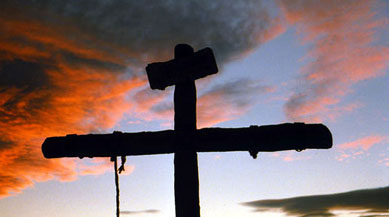
|
The Passion of the ChristBy Calvin TragerFebruary 25, 2004
The Passion of the Christ comes with a lot of baggage -- telling the core story of an entire religion in a movie will do that. Charges of anti-Semitism and questions of historical and Biblical accuracy have dogged the film since director Mel Gibson announced his intentions. Obviously depicting events and beliefs that have had a profound effect on history over the past 2000 years or so does potentially hold major implications, but let's just pretend for a moment that it's just a movie. Viewers will bring varying contexts, beliefs, and levels of knowledge to the film, but the object here is to examine The Passion of the Christ as a stand-alone film while trying as much as possible to not bring preconceived ideas into the equation. In this respect, The Passion of the Christ has major problems, and it really begins with the story itself. Though the film contains intense moments, it lacks any real dramatic arc and narrative force. In the film a group of Jewish leaders wants Jesus of Nazareth out of the picture, so they convince the Romans who rule the area to carry out his capital punishment by crucifixion. At that point Jesus is beaten, whipped, and tortured before having to carry his own cross through the city to the site of his crucifixion. We also learn that Jesus is the son of God, and it is his destiny to die in this way in order to absolve humans of their sins. The bulk of the film focuses on the suffering of Jesus. He is beaten, and whipped, and scourged, and forced to wear a crown of thorns, and forced to carry the cross, and beaten some more by the crowd, and finally crucified. These punishments are depicted in graphic detail - with much blood and gore and all the wounds the make up artist can supply. This dominates so much of the film that it is numbing to the point that of all things it becomes dull. It begins to feel that more than half the movie consists of watching Jesus drag the cross, which may conform to some scriptural accuracy, but in terms of dramatic narrative, it becomes tedious. The Passion of the Christ hits one note throughout its entire two hour running time. The thankless task of playing Jesus falls on Jim Caviezel. There is no nuance to his portrayal as there is no nuance written. He is asked for the most part to suffer nobly, which he does well. It's a bit of a shame because in flashback scenes, he does show a spark, but those flashbacks are far too few and far too brief to provide any insight or add depth to the character. One dimensionality is a common thread throughout the great majority of the characters in the film, and while this may serve well in a religious context it does not in a dramatic context. The instances where a character seems to have any inner conflict are rare, and they almost exclusively belong to Pontius Pilate. Hristo Shopov takes advantage of that and gives one of the more interesting performances in the film. What may (or may not) be most surprising, however, is that The Passion of the Christ really belongs to the women. While Jesus endures the physical suffering, it is the women in his life that endure the emotional suffering. It is more painful and emotionally affecting to watch Mary witness her son going through the ordeal than it is to sit through the many bloody whippings. Maia Morgenstern gives the standout performance and provides the film's most powerful moments. She has a touching moment with Pilate's wife, Claudia, and when she runs to comfort her son, the moment is intercut with a flashback that is admittedly manipulative, but she sells it and it works. There is much about The Passion of the Christ worthy of praise and admiration. The acting is fine, the sets are impressive, and the cinematography is stellar. It again must be stressed that placed in a religious context, the film may work better, and it is perhaps slightly unfair to try to view it outside of that context. But on the other hand, this is a movie review and not a religious discussion, and on those terms The Passion of the Christ does not deliver. It is simply lacking in story and momentum to drive the film forward and the result, although technically admirable, is slow-paced, repetitive, and plodding.
|
Thursday, January 08, 2026
© 2006 Box Office Prophets, a division of One Of Us, Inc.